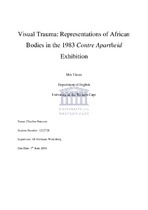Visual trauma: Representations of African bodies in the 1983 Contre Apartheid Exhibition
Abstract
After the 1976 student uprising, South Africa entered a period of increased violent state
repression. The struggle against apartheid also became increasingly globalised, as can be seen
in the UN resolution and the rise of various international anti-apartheid organisations. My
thesis looks at the various ways in which art was used as a response to the crisis of late
apartheid in the 1980s, focusing on a landmark international exhibition, the Art Contre
Apartheid exhibition which opened in Paris on 1983. It examines the context and history of
the Art Contre Apartheid collection, and follows its path to its current location at the
Mayibuye Archive at the University of the Western Cape, where it mostly languishes in
packing crates. My research locates its analysis of the works in broader debates around art
and politics during the struggle years in South Africa, but also to highlights the continuities
and contrasts between international responses to apartheid, and local struggle art produced in
the period surrounding the launch of the exhibition. Some of most compelling works of art in
the collection depict the human form, and register acts of torture. The analysis focuses
specifically on depictions of a fragmentation and dismemberment of the human body.
Drawing on Elaine Scarry's argument about the limitations of language as an adequate
response to trauma, my research develops an analysis of these works that demonstrates how
the body becomes a privileged site in which violent political contestations are made visible.
The thesis also deals extensively with the 'absence of form', which highlights the various
instances in the ACA collection where abstract art was used as a signifier of pain, and thus
the unspeakable effects of apartheid.

